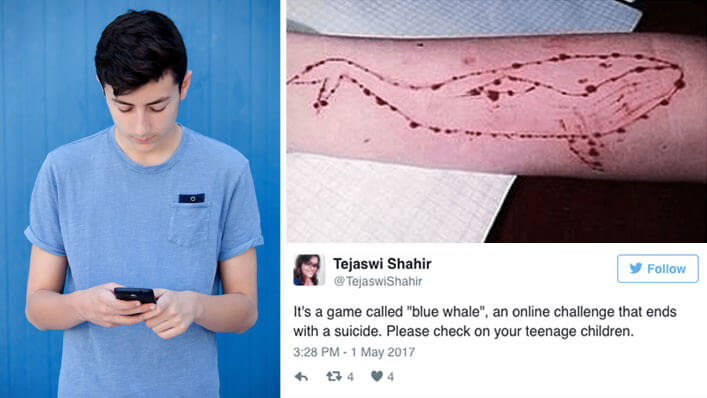The Blue Whale Challenge
An online game that transpired into a social media challenge, finally taking the shape of memes has made news worldwide, not only with its viral content but with the lives it allegedly claimed.
The Blue Whale Game is an online game that is rumoured to have been originated in Russia, with an early version of the game allegedly launched on the Russian social network VK in 2013. The game is alleged to have claimed its first victim from suicide in 2015. An expelled psychology student Philipp Budeikin has claimed to be the founder of the game.
It is reported that, “In Russia in 2016, Blue Whale came into broader use among teenagers after a journalist brought attention to it through an article that linked many unrelated suicide victims to the Blue Whale, creating a wave of moral panic in Russia. Later, Budeikin was arrested and pled guilty to “inciting at least 16 teenage girls to commit suicide”, leading to Russian suicide prevention legislation and renewed worldwide concern over the Blue Whale phenomenon.”
The Blue Whale Challenge
The game consists of a series of tasks assigned to players by unknown administrators over a 50-day period, with the final task pushing the player to commit suicide to fulfil the challenge. Ability to complete the final task would mean that you won the game. It is rumoured that having a cold feet and backing out of the game would prompt the administrators to ‘threaten’ the challengers or players with risk of leaking personal information and bringing harm upon close ones.
It is believed to have been inspired by the phenomenon referred to as beaching or cetacean stranding wherein cetaceans or aquatic mammals the likes of whales, dolphins and porpoises strand themselves on land resulting in death from dehydration, drowning from high tides or collapsing under own weight. There is no universally accepted reason as to why these aquatic mammals display such a peculiar behaviour.
A player writes, “The game is based on the relationship between the challengers and the administrators. It involves a series of duties given by the administrators that players must complete, usually one per day, some of which involve self-harm. Some tasks can be given in advance, while others can be passed on by the administrators on that day, the last task usually being suicide.”
I want in on the blue whale challange.
-making my way to the shore, the journey is the destiny . #comefindmeletmein #bluewhale.
I need …— வருண் (@varunempire) August 3, 2017
#Talk about it
Blue whale kinda went viral here in Brazil, my only question was and still is, who is retarded enough to participate?
— HasBaal (@Hasdru_Baal) August 3, 2017
So far, the game has claimed lives over Russia, Brazil, Spain, United States, Argentina, Chile, China, Colombia, Portugal, Italy, India among several other countries.
In India, a class 10 student from West Bengal’s Midnapore district allegedly committed suicide by suffocating himself on Saturday, following instructions on the Blue Whale game. As per the reports, he was last seen playing the Blue Whale online challenge.
The game is reported to have claimed 150 lives in Europe and Russia so far. The alleged founder Philipp Budeikin meant the game to be a way to ‘cleanse’ the society.
This is not the first incident in India in connection with the lethal Blue Whale challenge. Earlier on Thursday, a 13-year-old boy had tried to jump off the third floor of his building in Indore.
The hoopla started with a Mumbai boy killing himself, playing the game earlier in the month.
A final year student of psychology, Tara Sharma believes, “This game is not available easily. It’s an underground game that is slowly finding its way to the surface and social media thanks to the curiosity surrounding it. Teenagers are curious especially about social media challenges. Why shouldn’t be? However they lack the knowledge and ability to judge to what extent such a curiosity should be encouraged and entertained. Drawing the line is essential and most teens lack the maturity to understand that. That is where they need adult guidance.”
It is surprising how so many parents are unaware of the social media gimmicks which further create a distance with their children. Tara continues, “Parents need to understand the need of their children with context to their lives now, which includes social media lives. Also, what is alarming is not the rise of the game but the popularity it is achieving and the number of teenagers who can connect to the self-harming, suicide promoting nature of the game. We have an entire generation of unhappy teens and we are doing nothing about it. “










